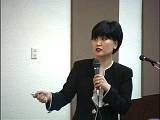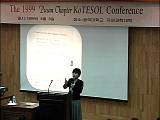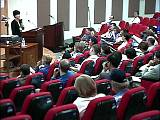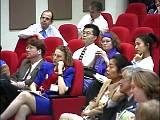ABSTRACT
Will the world in the new
millennium be peaceful or stressful? Stereotype, bias, prejudice, discrimination,
hatred, and war among the different linguistic and cultural groups: will
these be alleviated or aggravated? Will English teaching help any?
This talk raises fundamental questions: why do we teach/learn English?
And what is the role of English teachers? It addresses the pedagogical
concerns of the what and how to teach English. The presenter suggests that
we teach English in order to help our students become world citizens
by opening their eyes and minds to a newer and wider world, urging that
the teachers have more global perspectives along with competent teaching
skills. Illustrations will be made on Koreans' attitude and perception
of the English-speaking culture and suggestions will be given for how to
help improve English language and cultural competence.
PRESENTER
BIOGRAPHY
Dr. Joo-Kyung Park, a former
KOTESOL national president (1996-1997), holds a Ph.D. in Curriculum and
Instruction from Texas A&M University, specializing in ESL/Bilingual
Ed., and an M.A. in Linguistics from Seoul National University. Dr. Park
has taught ESL/EFL and KFL (Korean as a foreign language) at several universities
both in the States and Korea. She has been involved with teacher education
for primary and secondary teachers of English in Kwangju-Cholla Province
since 1993 as an advisor, program coordinator and instructor. She has presented
at major TESOL and Bilingual Education conferences held in U.S.A., U.K.,
Thailand, and Taiwan as well as in Korea. Her teaching and research interests
include teacher education, teaching pronunciation/speech, culture education,
and English program development. Currently, she is an assistant professor
of English Dept. of Honam University. She has also served as 2nd vice-president
of KOTESOL and Cholla Chapter president (1994-1995), 1st vice president
(1995-1996).
MATERIALS
The 3rd Pusan Chapter Conference
May 8, 1999
Teaching English:
Producing World Citizens
in the New Millenium
Joo-kyung Park, Ph.D.
(Honam University)
1. The Goals of Teaching
English in Korea
: To help students
to be able to
1) acquire 4 language skills
in English as a means of communication
2) appreciate Korean culture
through understanding of the English-speaking culture and to introduce
the Korean
culture to the foreign countries
3) understand the global
society and make international cooperation
2. The Current Issues
of English Language Education in Korea
1) The role of English in
college entrance exams in Korea and its influence on the learners'
motivation
of and attitude toward learning English
2) The implementation of
English language education in elementary schools
3) The implementation of
ability-based English classes in secondary schools
4) The implementation of
the practical English skill-oriented classes as a required course in colleges
along with
computer courses
5) Pre- and in-service teacher
training for elementary and secondary English teachers
6) The issues concerning
the native English speakers as classroom teachers and teacher trainers:
- Their role
and effectiveness;
- Developing
team teaching strategies between foreign expatriate teachers and Korean
national
teachers;
- The necessity
and the direction of developing education programs for native English-speaking
teachers
3. Korean Students' Perception
of and Attitudes toward American Culture and Society
1) American cultural
experience
¡¤No
personal contact - 25 (33%)
¡¤Had
an English-speaking teacher in
a high school - 22
(29%)
college - 12 (16%)
a middle school -
6 (8%)
hogwon - 4 (5%)
¡¤A
short trip to the States - 7 (9%)
2) What they know about
America and American
America
¡¤The
center of the world
¡¤military
power
¡¤economic
power
¡¤high
crime rate
¡¤capitalism
¡¤freedom
(of speech)
¡¤huge
land and beautiful nature
¡¤individualism
¡¤a
land of opportunity or equity
¡¤sex,
sports, leasure
¡¤racial
discrimination
¡¤Hollywood,
NBA, McDonald's
American
¡¤liberal,
reasonable, friendly, punctual
¡¤violent,
obese
¡¤Bill
Clinton, Monica Lewinsky, Michael Jordan, Abraham Lincoln
3) How they like America
and American
I like
America very much. - 1/75 (1%)
I like
America. - 32/75 (43%)
So so.
- 33/75 (44%)
I don't
like America. - 3/75 (4%)
4) Why and What they
want to learn
Why
¡¤America
is the center of the world. Therefore, knowing America is a must at the
survival
level.
¡¤A
lot of stereotypes and false image of America and American people are prevalent
among the
Korean people. The
real aspects of them should be taught.
¡¤Knowing
culture is a must for learning the language
What
¡¤America's
strengths and weaknesses
¡¤The
difference between Korea and America
¡¤American
way of life and thought
5. Korean Students' Wants
and Needs
1) English proficiency
¡¤Basic
Interpersonal Communicative Skill (BICS)
¡¤Cognitive
Academic Language Proficiency (CALP) (Cummins, 1981)
2) Cultural understanding
and sensitivity for better communication and to make a better, 'peaceful
and patient' world
(Crystal, 1997)
3) Positive attitude and
non-judgemental manner
4) Awareness for the global
issues
6. Qualifications for
English Teachers
1) Appropriate Attitudes
towards Korean/English language and culture, and the students
2) Sincere, caring, and
patient personality
3) Knowledge of relevant
theories of language learning and teaching: Curriculum and instruction
theory, evaluation
methods, learning styles and strategies
4) Appropriate communication
skills in English to make as much comprehensible input as possible
depending on
the student level of proficiency: native English-speaker teacher can excell
to the
Korean national
teachers
5) English teaching skills
to activate student's schema and facilitate learning: knowing the students
is the key
to this; Korean national teachers can better up.
6) Professional commitment:
professional organizational membership, presentation at the professional
conferences,
and publication
7. Conclusion
1) Collegial cooperation
between Korean-national and native English-speaker teachers can make a
big difference in
English education in Korea.
2) Language teachers are
like missionaries in a sense that they help people open their eyes and
minds
to a new world with
a new view. A tough job but it's worth, INDEED!
REFERENCES
D. Crystal (1997). English
as a Global Language. Cambridge University Press.
J. Cummins (1981). Four
misconceptions about language proficiency in bilingual education.
NABE Journal, 5(3),
31-45.
C. Edelhoff (1985). A view
from teacher in-service education and training. In R. Quirk & H. G.
Widdowson (Eds.),
English in the world. NY: Cambridge University Press.
D. Graddol (1997). The Future
of English? The British Council.
J. Park (1997). Integrating
culture into communicative English teaching. English Teaching 52(4), 135-154.
The
Korea Association
of Teachers of English.
L. Smith (1998). Who are
the best English teachers in Korea? The 1st Seoul International Conference
of ALAK Proceedings
(p.49), Applied Linguistics Association in Korea.
W. M. Rivers (1981). Teaching
Foreign Language Skills (2nd ed.) Chicago: The University of
Chicago Press.
S. Shin, E. Park, &
J. Lee (1999). Modern English Education. Moon-Kyoung Publishing Co.
APPENDIX
Questionnaire
1. Name: 2. Gender:
F M
3. Age:
4. Major:
5. Self-evaluation on English
proficiency
: Beginner, Intermediate,
Advanced, Native-like
6. American cultural experience
When & How long:
Where:
How
7. What comes to your mind
first when you hear the word 'America'?
8. What comes to your mind
first when you hear the word 'Americans'?
9. How do you like America?
: I like it very much,
I like it. So so.
I don't like
it. I hate it very much.
Why, in what
aspect?
10. Where did you learn (or
hear) about America and American?
: university classes
(conversation, writing, culture, reading,
and so on) newspaper,
magazines, TV, Videos, Movies, and
other (
)
|
![]()




